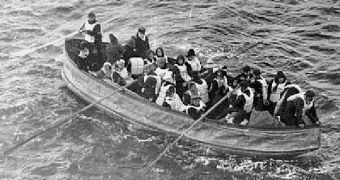A new investigation led by researcher Bruno Frey at the University of Zurich in Switzerland has discovered that English passengers aboard the HMS Titanic had a higher fatality rate than others, simply because they did not forget their manners in time of crisis, and were more likely to wait orderly in queues rather than try to push ahead of the line. This proves that altruism and bravery were still remembered among Britons at the time, and their sacrifice ensured that a number of 706 passengers survived the terrible accident, which claimed the lives of some other 1,517.
“The Americans at that time were not very cultured, while the English were still gentlemen. The British were much more aware of the social norms at the time. They would have been more likely to stand in a queue and wait their turn for boarding the lifeboats than Americans,” Frey says. The giant liner struck a huge iceberg on April 14th, 1912, during its maiden voyage to New York. There were an estimated 2,223 passengers on board, but their exact number will never be known, due to the fact that the third class rooms were packed, and not everyone had a ticket.
Grey also explains that personal education played a major role in the way Americans and Britons handled the disaster. Most US citizens, who lived inland and away from the sea, were not familiar with the women-and-children-first-type of protocol, so they rushed to the railing, completely disregarding the warnings of the crew. On the other hand, the British, who had been living on their island for quite a few years, knew these things, and thought that by panicking and running around desperately they would only delay the overall rescue effort.
“We expected that the English passengers would have been more able to survive, because the ship was British built, the company was British, and the crew was British. We thought that if the passengers had close relationships with the crew, that would be very important in getting to the lifeboats. But it turned out the English had around an 11 per cent lower chance of being saved compared with all the other nationalities,” Frey adds.
“We really thought we'd be able to show that, when it's a matter of life and death, the cultural norms disappear and the survival of the fittest comes into play,” he maintains. “Overall, the results indicate a strong support that social norms and altruism do matter,” Australia's Queensland University of Technology researcher David Savage concludes.

 14 DAY TRIAL //
14 DAY TRIAL //